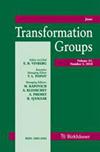模块不变环的局部同调
IF 0.4
3区 数学
Q4 MATHEMATICS
引用次数: 0
摘要
对于 K 这个域,考虑 G 的有限子群({\text {GL}}_n(K)\)及其在多项式环 \(R:=K[x_1,\dots ,x_n]\)上的自然作用。让 \(\mathfrak {n}\) 表示不变式环 \(R^G\)的同质最大理想。我们将研究局部同调模块 \(H^n_{\mathfrak {n}}(R^G)\) 与 \(H^n_{\mathfrak {n}}(R)^G\) 的比较。结果得到了关于 \(H^n_\mathfrak {n}(R^G)\) 的 a-invariant 和 Hilbert 序列的各种结果。本文章由计算机程序翻译,如有差异,请以英文原文为准。
Local Cohomology of Modular Invariant Rings
For K a field, consider a finite subgroup G of \({\text {GL}}_n(K)\) with its natural action on the polynomial ring \(R:= K[x_1,\dots ,x_n]\). Let \(\mathfrak {n}\) denote the homogeneous maximal ideal of the ring of invariants \(R^G\). We study how the local cohomology module \(H^n_{\mathfrak {n}}(R^G)\) compares with \(H^n_{\mathfrak {n}}(R)^G\). Various results on the a-invariant and on the Hilbert series of \(H^n_\mathfrak {n}(R^G)\) are obtained as a consequence.
求助全文
通过发布文献求助,成功后即可免费获取论文全文。
去求助
来源期刊

Transformation Groups
数学-数学
CiteScore
1.60
自引率
0.00%
发文量
100
审稿时长
9 months
期刊介绍:
Transformation Groups will only accept research articles containing new results, complete Proofs, and an abstract. Topics include: Lie groups and Lie algebras; Lie transformation groups and holomorphic transformation groups; Algebraic groups; Invariant theory; Geometry and topology of homogeneous spaces; Discrete subgroups of Lie groups; Quantum groups and enveloping algebras; Group aspects of conformal field theory; Kac-Moody groups and algebras; Lie supergroups and superalgebras.
 求助内容:
求助内容: 应助结果提醒方式:
应助结果提醒方式:


